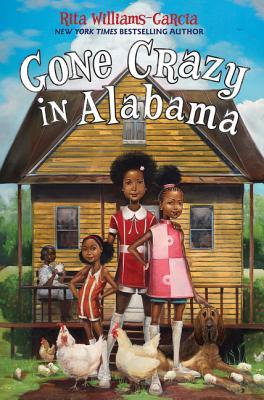 |
| Click to view on Goodreads |
Powerful and humorous, this companion to the award-winning One Crazy Summer and P.S. Be Eleven will be enjoyed by fans of the first two books, as well as by readers meeting these memorable sisters for the first time.
(304 pages)
I didn't actually realize until after I'd finished it that Gone Crazy in Alabama is the third book in a trilogy. This somehow seems like very important information to me now, but while I was reading it I had no idea. I definitely doesn't feel like you're missing anything if you haven't read previous books, though I'm sure you are.
It's a good book, though a little convoluted at times. There are so many relatives that they learn about that I almost wanted to draw out a family tree to keep everyone straight. So many of the stories the girls learn are heartbreaking - like the man who had two wives and a different daughter with each, and the Native American woman whose father sold her husband (an escaped slave) and their children into slavery - and it's so sad to see how there's both a connect and a disconnect between family members that's so different from today's. Delphine's family roots are traced back into her great-great grandparents, and it's considered normal to have cousins that are really just second or third cousins that you treat like first cousins. At the same time, even though there's an intimacy in the accounting of who is a member of the family there's also a disconnect; for example, there's the white sheriff in town who's technically the girls' cousin (a real first cousin), but who still treats them like riffraff when they come into town. In a family where the color line is so blurred, where the main characters have bloodlines from three very different races, some still refuse to see their relatedness to others because of the outward difference in their skins. It's terrible.
I can't say that this was my favorite book in the world, both because it was very frustrating (in a life-isn't-fair sort of way) and because after a while I got sick of reading about so many imperfect and rather unhappy people. The threads of liberty versus prejudice run deep and are interesting to analyze through Delphine's eyes as she struggles to compare her free Northern upbringing with the repressed racism that faces her in Alabama. I don't know exactly how long ago the book is set (the Jackson Five were still performing, so maybe fifty years?), but it's sad to see that it definitely wasn't as long ago as I could have wished. Sad, and uncomfortable.
If you're interested in this book, then by all means read it. I'm not going to shove it down people's throats, and I don't know that I'll ever take the time to purposefully re-read it, but Gone Crazy in Alabama was a very interesting and enlightening read for me personally. It could be for you, too.
I didn't actually realize until after I'd finished it that Gone Crazy in Alabama is the third book in a trilogy. This somehow seems like very important information to me now, but while I was reading it I had no idea. I definitely doesn't feel like you're missing anything if you haven't read previous books, though I'm sure you are.
It's a good book, though a little convoluted at times. There are so many relatives that they learn about that I almost wanted to draw out a family tree to keep everyone straight. So many of the stories the girls learn are heartbreaking - like the man who had two wives and a different daughter with each, and the Native American woman whose father sold her husband (an escaped slave) and their children into slavery - and it's so sad to see how there's both a connect and a disconnect between family members that's so different from today's. Delphine's family roots are traced back into her great-great grandparents, and it's considered normal to have cousins that are really just second or third cousins that you treat like first cousins. At the same time, even though there's an intimacy in the accounting of who is a member of the family there's also a disconnect; for example, there's the white sheriff in town who's technically the girls' cousin (a real first cousin), but who still treats them like riffraff when they come into town. In a family where the color line is so blurred, where the main characters have bloodlines from three very different races, some still refuse to see their relatedness to others because of the outward difference in their skins. It's terrible.
I can't say that this was my favorite book in the world, both because it was very frustrating (in a life-isn't-fair sort of way) and because after a while I got sick of reading about so many imperfect and rather unhappy people. The threads of liberty versus prejudice run deep and are interesting to analyze through Delphine's eyes as she struggles to compare her free Northern upbringing with the repressed racism that faces her in Alabama. I don't know exactly how long ago the book is set (the Jackson Five were still performing, so maybe fifty years?), but it's sad to see that it definitely wasn't as long ago as I could have wished. Sad, and uncomfortable.
If you're interested in this book, then by all means read it. I'm not going to shove it down people's throats, and I don't know that I'll ever take the time to purposefully re-read it, but Gone Crazy in Alabama was a very interesting and enlightening read for me personally. It could be for you, too.
No comments:
Post a Comment
Join the conversation!